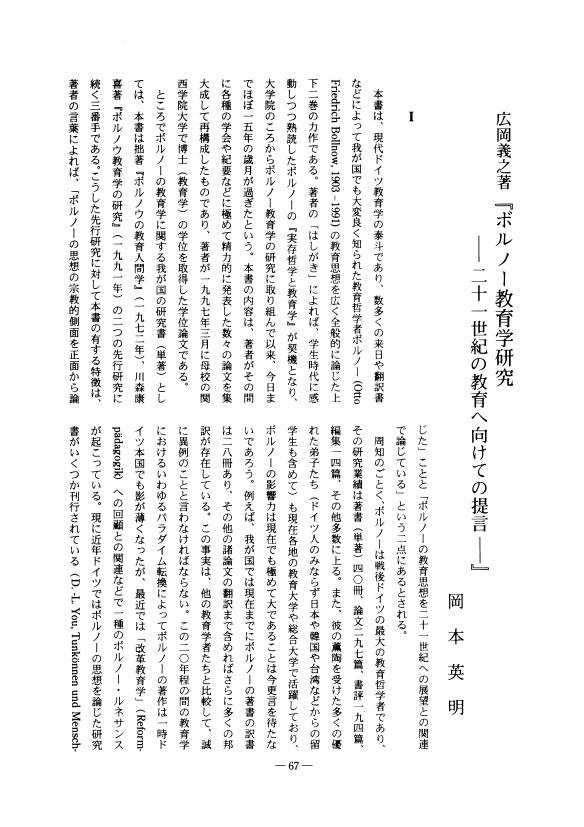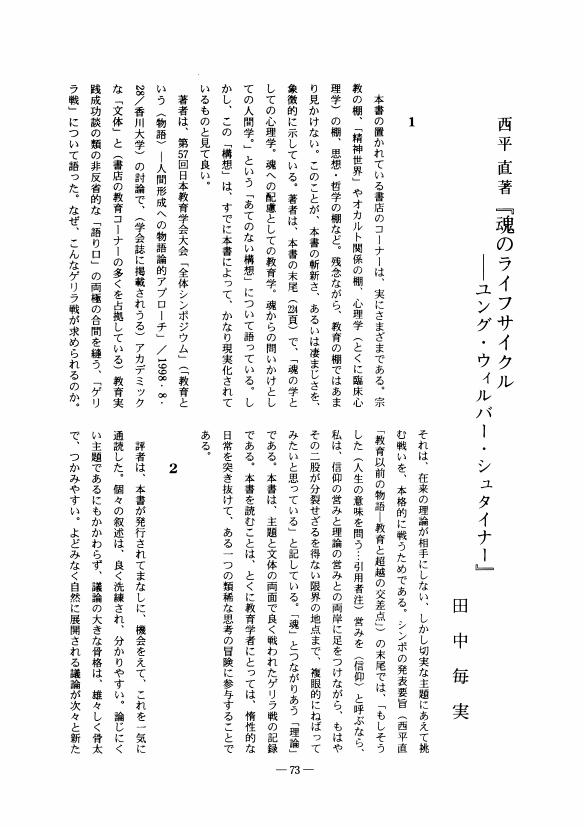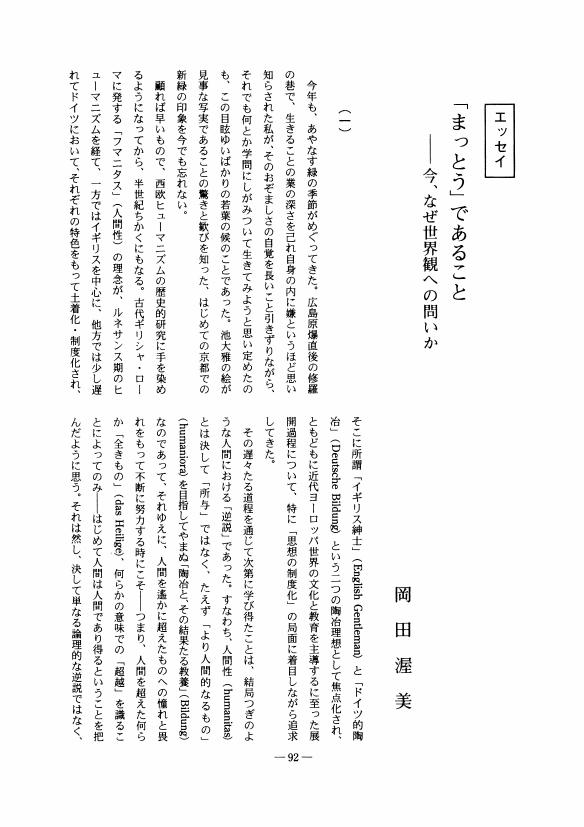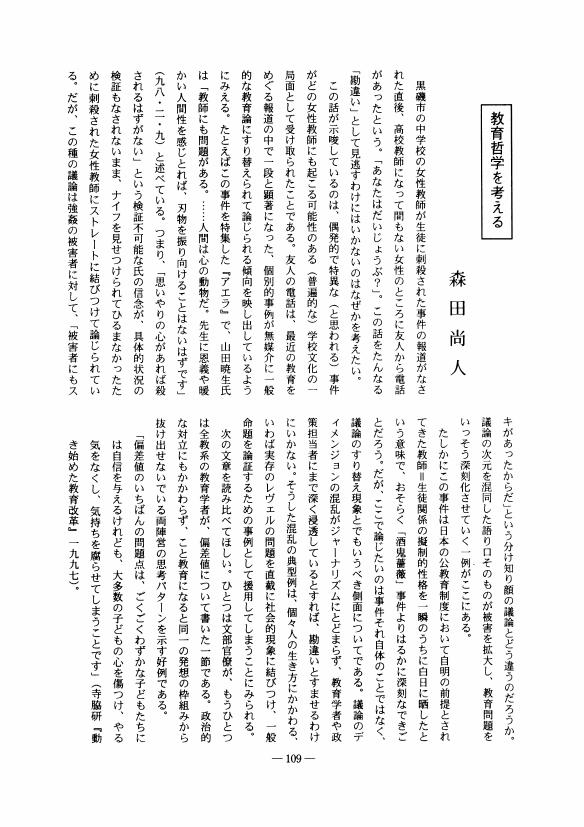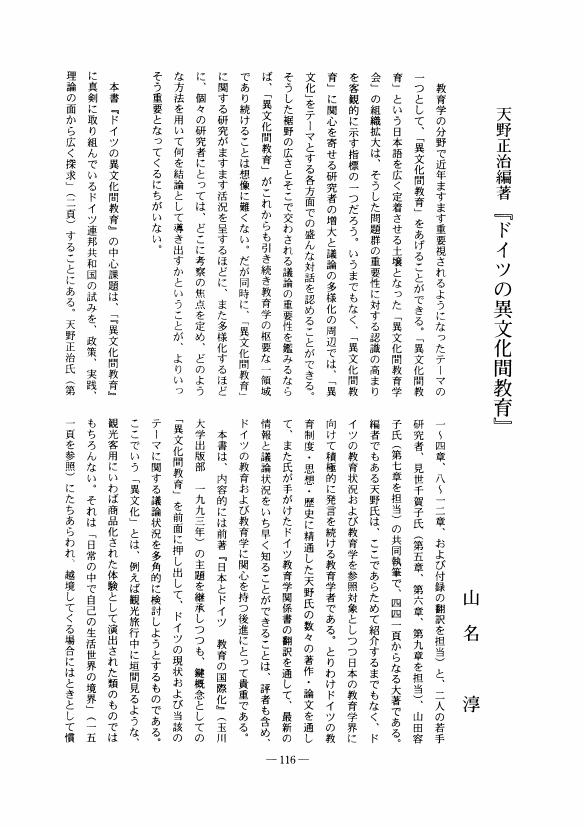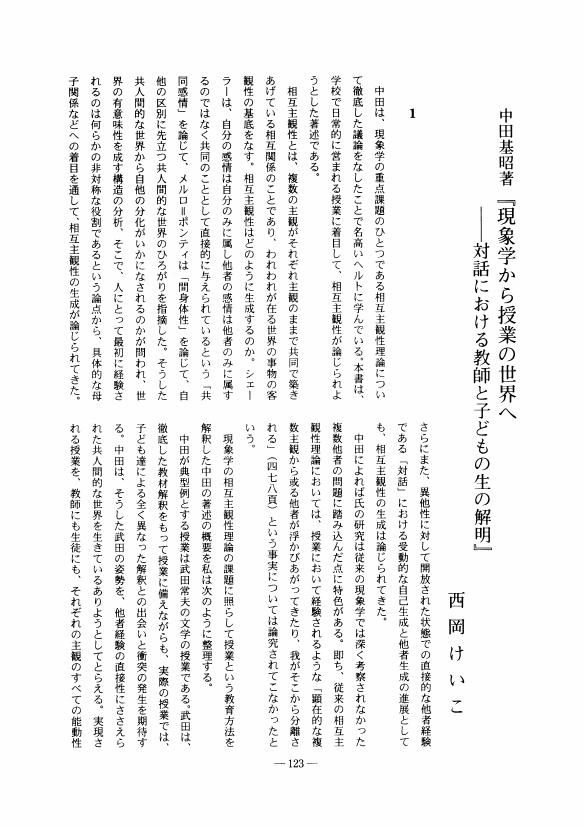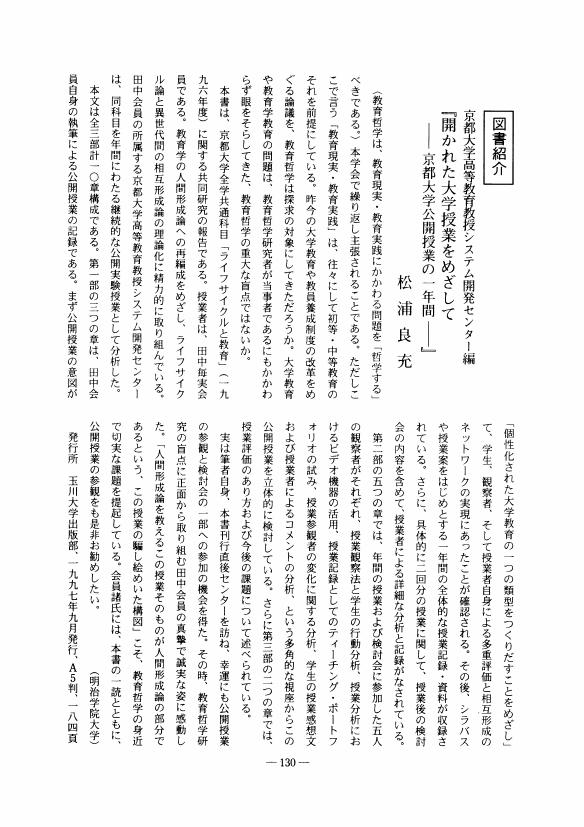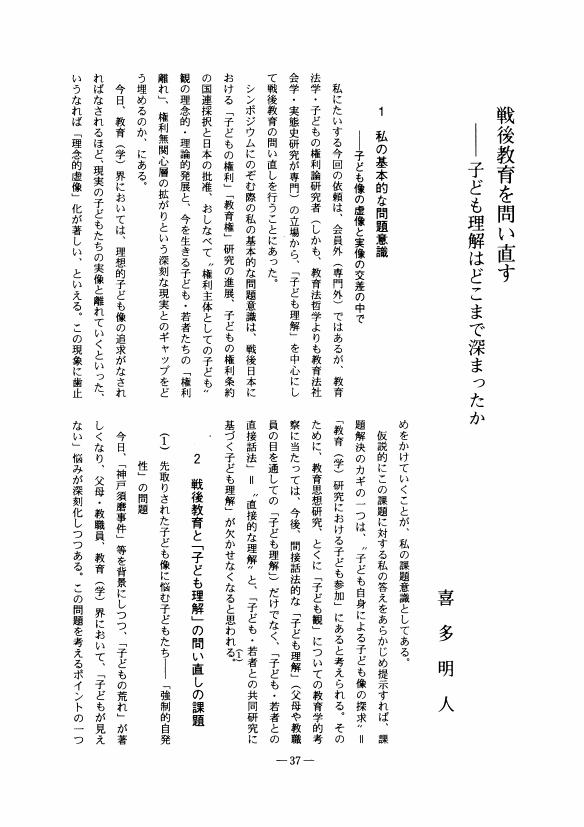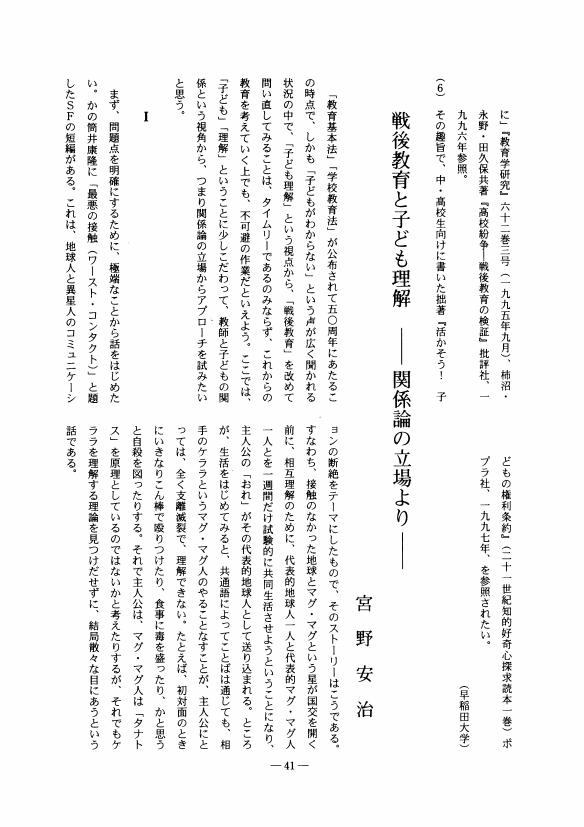1 0 0 0 OA みんなの〈事〉としての教育のために
- 著者
- 齋藤 昭
- 出版者
- 教育哲学会
- 雑誌
- 教育哲学研究 (ISSN:03873153)
- 巻号頁・発行日
- vol.1998, no.78, pp.45-46, 1998-11-10 (Released:2010-05-07)
1 0 0 0 OA ボーフム大学ディルタイ研究所と精神科学の歴史と理論
- 著者
- 森 邦昭
- 出版者
- 教育哲学会
- 雑誌
- 教育哲学研究 (ISSN:03873153)
- 巻号頁・発行日
- vol.1998, no.78, pp.47-51, 1998-11-10 (Released:2009-09-04)
1 0 0 0 OA 今井康雄著『ヴァルター・ベンヤミンの教育思想-メディアのなかの教育-』
- 著者
- 森田 伸子
- 出版者
- 教育哲学会
- 雑誌
- 教育哲学研究 (ISSN:03873153)
- 巻号頁・発行日
- vol.1998, no.78, pp.52-59, 1998-11-10 (Released:2009-09-04)
1 0 0 0 OA 佐藤学著『教師というアポリア-反省的実践へ-』
- 著者
- 高橋 勝
- 出版者
- 教育哲学会
- 雑誌
- 教育哲学研究 (ISSN:03873153)
- 巻号頁・発行日
- vol.1998, no.78, pp.60-66, 1998-11-10 (Released:2009-09-04)
1 0 0 0 OA 広岡義之著『ボルノー教育学研究-二十一世紀の教育へ向けての提言-』
- 著者
- 岡本 英明
- 出版者
- 教育哲学会
- 雑誌
- 教育哲学研究 (ISSN:03873153)
- 巻号頁・発行日
- vol.1998, no.78, pp.67-72, 1998-11-10 (Released:2009-09-04)
1 0 0 0 OA 西平直著『魂のライフサイクル-ユング・ウィルバー・シュタイナー』
- 著者
- 田中 毎実
- 出版者
- 教育哲学会
- 雑誌
- 教育哲学研究 (ISSN:03873153)
- 巻号頁・発行日
- vol.1998, no.78, pp.73-79, 1998-11-10 (Released:2009-09-04)
1 0 0 0 OA 「まっとう」であること 今、なぜ世界観への問いか
- 著者
- 岡田 渥美
- 出版者
- 教育哲学会
- 雑誌
- 教育哲学研究 (ISSN:03873153)
- 巻号頁・発行日
- vol.1998, no.77, pp.92-108, 1998-05-10 (Released:2009-09-04)
1 0 0 0 OA 教育哲学を考える
- 著者
- 森田 尚人
- 出版者
- 教育哲学会
- 雑誌
- 教育哲学研究 (ISSN:03873153)
- 巻号頁・発行日
- vol.1998, no.77, pp.109-110, 1998-05-10 (Released:2009-09-04)
1 0 0 0 OA 宮寺晃夫著『現代イギリス教育哲学の展開-多元的社会への教育-』
- 著者
- 山崎 高哉
- 出版者
- 教育哲学会
- 雑誌
- 教育哲学研究 (ISSN:03873153)
- 巻号頁・発行日
- vol.1998, no.77, pp.111-115, 1998-05-10 (Released:2010-01-22)
1 0 0 0 OA 天野正治編著『ドイツの異文化間教育』
- 著者
- 山名 淳
- 出版者
- 教育哲学会
- 雑誌
- 教育哲学研究 (ISSN:03873153)
- 巻号頁・発行日
- vol.1998, no.77, pp.116-122, 1998-05-10 (Released:2009-09-04)
1 0 0 0 OA 中田基昭著『現象学から授業の世界へ-対話における教師と子どもの生の解明』
- 著者
- 西岡 けいこ
- 出版者
- 教育哲学会
- 雑誌
- 教育哲学研究 (ISSN:03873153)
- 巻号頁・発行日
- vol.1998, no.77, pp.123-129, 1998-05-10 (Released:2009-09-04)
- 著者
- 松浦 良充
- 出版者
- 教育哲学会
- 雑誌
- 教育哲学研究 (ISSN:03873153)
- 巻号頁・発行日
- vol.1998, no.77, pp.130, 1998-05-10 (Released:2009-09-04)
- 著者
- 舟山 俊明
- 出版者
- 教育哲学会
- 雑誌
- 教育哲学研究 (ISSN:03873153)
- 巻号頁・発行日
- vol.1998, no.77, pp.131-132, 1998-05-10 (Released:2009-09-04)
1 0 0 0 OA 研究討議に関する総括的報告
- 著者
- 尾田 幸雄 田井 康雄
- 出版者
- 教育哲学会
- 雑誌
- 教育哲学研究 (ISSN:03873153)
- 巻号頁・発行日
- vol.1998, no.77, pp.26-30, 1998-05-10 (Released:2009-09-04)
1 0 0 0 OA 子ども理解はどこまで深まったか
- 著者
- 田中 孝彦
- 出版者
- 教育哲学会
- 雑誌
- 教育哲学研究 (ISSN:03873153)
- 巻号頁・発行日
- vol.1998, no.77, pp.31-36, 1998-05-10 (Released:2009-09-04)
1 0 0 0 OA 戦後教育を問い直す 子ども理解はどこまで深まったか
- 著者
- 喜多 明人
- 出版者
- 教育哲学会
- 雑誌
- 教育哲学研究 (ISSN:03873153)
- 巻号頁・発行日
- vol.1998, no.77, pp.37-41, 1998-05-10 (Released:2009-09-04)
- 参考文献数
- 6
1 0 0 0 OA 戦後教育と子ども理解-関係論の立場より-
- 著者
- 宮野 安治
- 出版者
- 教育哲学会
- 雑誌
- 教育哲学研究 (ISSN:03873153)
- 巻号頁・発行日
- vol.1998, no.77, pp.41-46, 1998-05-10 (Released:2009-09-04)
1 0 0 0 OA 課題研究についての報告
- 著者
- 原 聡介 皇 紀夫
- 出版者
- 教育哲学会
- 雑誌
- 教育哲学研究 (ISSN:03873153)
- 巻号頁・発行日
- vol.1998, no.77, pp.47-50, 1998-05-10 (Released:2009-09-04)
1 0 0 0 OA ハーバーマスの討議倫理学における道徳的観点の検討
- 著者
- 西野 真由美
- 出版者
- 教育哲学会
- 雑誌
- 教育哲学研究 (ISSN:03873153)
- 巻号頁・発行日
- vol.1998, no.77, pp.51-64, 1998-05-10 (Released:2009-09-04)
- 参考文献数
- 11
This paper explores the possibility of reconstructing a theory of moral education in a pluralistic society, on the basis of the discourse ethics of Jürgen Habermas. Toward this end the author examines the “moral point of view” in discourse ethics in order to grasp clearly the idea of morality as the rational procedure of conflict adjudication.Discourse ethics represents an attempt to elucidate the rational basis of consensus formation on moral problems through practical discourse. From the universalistic structure of moralpractical discourse, Habermas sheds new light on the abstractive and co-operative features of the point of view of morality.However, his attempt has given rise to much debate in moral theory. This paper deals with the following issues; first, the conflict between ethics of justice and ethics of care, then, second, the differentiation of justice from good life, and lastly, the elimination of the fruitfulness of plurality by the consensus-focused discourse.By identifying the moral point of view with impersonal perspectives that regulate fair social co-operation in the public sphere, Habermas strives on the one hand, to retrieve the critical power of morality against reality, and, on the other hand, to reconcile the fragility of the human beings as individuated, through socialization.This dual function of morality indicates that moral education has to face two tasks at once. Namely, moral education has to provide children with the moral basis in multicultural society by both developing a moral point of view as a transcendental perspective and by nurturing practical reason, or phronesis, which will pave the way for reconstructing the life-world permeated with justice and solidarity.
1 0 0 0 OA ルドルフ・シュタイナーの人智学的認識論に関する一考察
- 著者
- 衞藤 吉則
- 出版者
- 教育哲学会
- 雑誌
- 教育哲学研究 (ISSN:03873153)
- 巻号頁・発行日
- vol.1998, no.77, pp.65-77, 1998-05-10 (Released:2009-09-04)
- 参考文献数
- 25
Pro und Kontra der Steiner-Pädagogik entspringt im allgemeinen aus dem Problem der Gültigkeit der anthroposophischen Erkenntnistheorie als deren Grundlage. Aber das Problem bleibt heute von Anfang bis zum Ende oberflächlich und unfruchtbare Diskussion, weil es vom jeweiligen theoretischen Standpunkt-besonders der erfahrungswissenschaftlichen Erziehungswissenschaft und Anthroposophie usw.-aus angegangen wird.Diese Abhandlung richtet sich daher auf die anthroposophische Erkenntnistheorie-insbesondere auf den Hintergrund ihrer Entstehung und ihere Gedankenstruktur-als den Schlüssel zur Lösung der Polemik urn die Steiner-Pädagogik und will damit zur Klärung eines so komplizierten Ploblems urn die Steiner-Pädagogik beitragen.Als Folge der obigen Betrachtung wird sich ein neuer Aspekt zum Verstandnis der Steiner-Pädagogik zeigen-Erkenntnis als die Verwandlung des Subjekts nach der Metamorphose-Theorie; Erkenntins, die mit dem Sein verbindet; Billigung des methodologischen Pluralismus.




